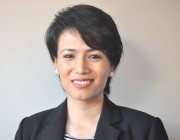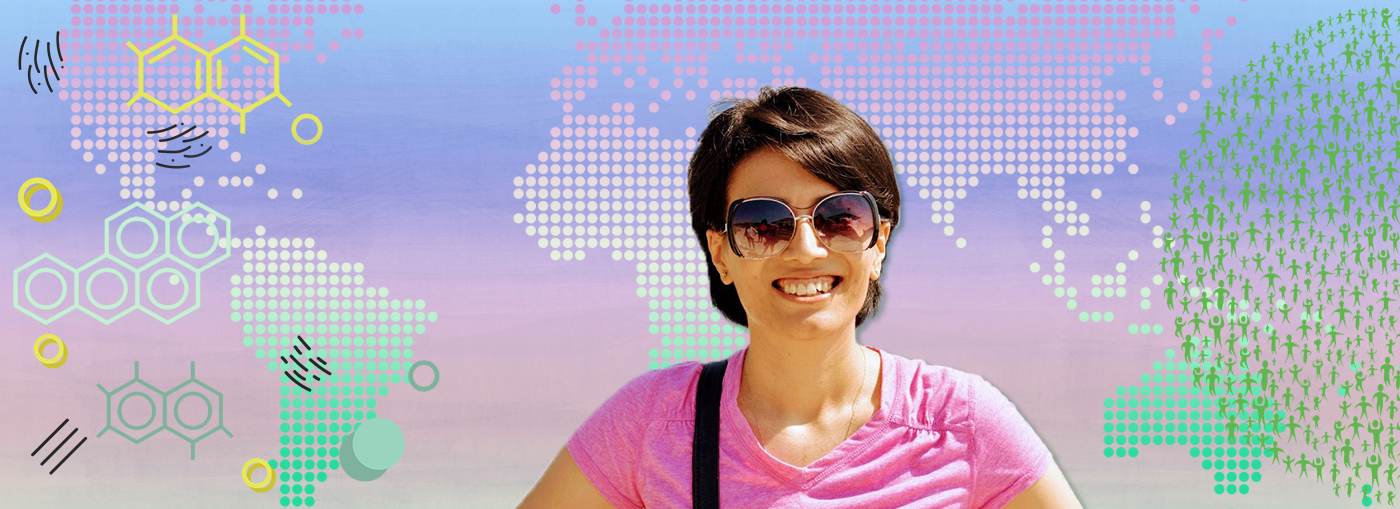Public health is a very interdisciplinary field. Please tell us what a typical public health class is comprised of. What majors can go into public health? What are the career avenues for public health professionals?
Since public health is an interdisciplinary field, the classes can be quite different. The foundation is usually some epidemiology classes and some statistics classes, followed by the elective classes that you can pick from depending on your interests. For example, if you want to focus on infectious diseases, you would learn about the biology of the disease, prevention, cure and its social determinants. If you are interested in health systems, then you will learn about different kinds of health financing mechanisms, governance issues, etc. If you are interested in monitoring and evaluation, you will take classes in impact evaluation, econometrics, research design, etc.
I went into public health with a very quantitative background so that was my niche in graduate school as well. People in public health come from a wide range of backgrounds–medicine, dentistry, pharmacy, humanities, law, economics, sociology, biology, mathematics, etc. come to mind.
As for career avenues, you can be a public health practitioner in many ways. For example, medical doctors with public health degrees can apply their public health knowledge in treating their patients and generate new knowledge, one can work in various global health implementing agencies–design and run interventions in global health, manage grants, run monitoring and evaluation of different programs. You can also be a public health academic where you generate new knowledge in the field. Some of my friends from graduate school have also gone into healthcare consulting after a public health degree.
You did your bachelors degree in chemical engineering and masters and doctorate in public health. Please tell us why you chose chemical engineering as an undergraduate and then chose to go for public health as a graduate student.
I think my underlying interests have not really changed between my chemical engineering undergraduate, my public health Sc.D., and my job right now. I am inherently interested in systems–how to design them, how to maximize outputs, how to identify and ameliorate bottlenecks. My undergraduate in chemical engineering helped me build a strong quantitative and analytical mindset on how to think about systems. I was not as interested in the usual applications of chemical engineering though–in oil plants, chemical factories, etc. So during my doctoral degree in public health, I learnt how to apply the systems-thinking in an area that was inherently more interesting to me which is health systems.
When I applied to graduate schools though, I applied to computational biology programs as well as to public health programs, and got into both kinds of schools. Eventually, I decided to pick public health because of my interest in health policy, governance, in health systems, in contributing towards ensuring access to essential health services for everyone.
As we proceed in our academic career, our interests and priorities change which make us want to change our academic paths. But we are still cautious about making such changes. Can you please share your opinion on this?
It is prudent to be cautious while making changes in your life, be it in professional or personal space. However, the cautiousness should lead to a careful introspection of your priorities and your life goals. It is definitely possible to change careers or academic interests but you need to precede it with a lot of groundwork, in understanding yourself, and the field you are thinking of getting into.
Women who start with engineering and physical sciences in undergraduate tend to pursue life sciences, social sciences and interdisciplinary fields for higher studies. What do you say about this phenomenon?
I think in general, the engineering and sciences background at the undergraduate level form a solid foundation for one’s career, but I am likely biased. I think the opportunity to select one’s career whether in engineering or in social sciences should present itself equally to everyone, but it is evident that this is not the case because of overt and hidden prejudices and inequitable societal structure.
I have faced issues with overt and hidden prejudices both in the engineering field and in the public health field, like most women/ minorities do. In terms of choosing public health after chemical engineering, I can speak for myself, and say that my intellectual curiosity in selecting first chemical engineering, and then public health has not altered–I still apply a systems-thinking in my work, only the application has changed. From thinking about power plants/ chemical plants, now I think about health systems and people.
Do you wonder what it would have been like if you had pursued engineering for higher studies?
I don’t. I did wonder when I was in graduate school, but that was more the gruel of being in graduate school rearing its head.
Tell us about a time you made an exciting breakthrough — or any other highlight in your journey so far.
The highlights change depending on context. In the context of research highlights/ breakthrough, I would say publishing health policy papers and reports– one particular study in Nepal comes to mind where my co-author Victoria and I found that a government program to increase facility-based delivery in poor districts in Nepal only had an impact in districts with adequate road network. Results from another paper of mine with colleagues which quantified the costs and benefits of education were used to make a case for increasing investments in education in developing countries. I have another upcoming paper that shows the extent of skewed sex ratio at births in Nepal, and correlates it with socio-economic factors that I hope will be useful in setting better policies for gender equity.
In the context of implementation, and real-world impact highlights, I currently work in the health, nutrition and population unit in the Africa region within the World Bank, and the projects I am supporting aim to improve health facilities and access to healthcare–this is the highlight of my day almost everyday.
Tell us about a time you had serious doubts about your own ability in the fields you chose. How did you overcome that?
I would not say that I spend any substantial time ruminating on self-doubts, at least I have not in some time now. There are many times of course, when I do not know something, but my priority then is to act on it. If it is useful or interesting to fill that knowledge gap, I work on it. Otherwise, I focus on other tasks that are more pressing and important at the moment. I do not think it is important or possible to know everything, so lack of knowledge does not necessarily create self-doubt in me.
There is also the imposter syndrome, when you might feel like you do not belong, but thanks to my parents, I was raised to prove naysayers wrong. It definitely takes hard work to build real self-confidence, and I think both are important. Confidence without knowledge is worthless, and so is knowledge without confidence.
If you were on the admissions committee, what qualities would you look for in a prospective graduate candidate in Public Health?
Passion for health justice/ research/ implementation, critical thinking skills, good communication skills. Quantitative skills are always useful.
How can prospective graduate students prepare themselves for pursuing graduate studies in public health?
Because the field is so interdisciplinary, there is no one way to prepare yourself for pursuing graduate studies in public health. If you want a more quantitative focus, then taking maths/ statistics classes is always a good idea. If you want a qualitative focus, then having some qualitative research background will help. Program implementation background in NGOs/ INGOs/ government agencies is also a plus. A life sciences/ medical background, especially if the intent is to be a physician/ surgeon with a public health focus, will also be useful.
Can you recommend 3 resources for people looking to get into your field ?
WorldBank Health Blog
Consortium of Universities for Global Health
The Guardian> Global Health
Tell us about the role of mentorship in your professional life.
I think it is important to have peer mentors and senior mentors in your field to be able to bounce off career plans, and next steps. I have sought and have been lucky to receive good mentorship from alumni in my college, from my professors, and colleagues that I have worked with. My professional mentors have been sources of advice and inspiration, and I deeply value their contributions in my professional life.
What is the best career advice you have ever received?
From my father: Work hard, and always have a plan.
From my mother: Work hard, and do not let others dictate the terms of your life.
The career advice you wished you received in your twenties.
Be more assertive!
Please share your experiences on the opportunities and responsibilities of being at the forefront of cutting edge research as a Nepali national.
The organization that I work for does produce cutting edge research in development, but the bulk of our work is in supporting countries implement sound research to improve living conditions and access to opportunities. My decision to move from research to implementation was in part, because I am Nepali, and I wanted to work in a field where I could impact health and living conditions in countries like Nepal. There are instances when international development work and research could feel like neocolonialism 2.0, but I hope to be one of the many many many people in this field who are actively trying to squash that.
Final words of advice for someone who wants to pursue their interest in public health.
Like with most careers, a career in public health has its set of rewards and challenges. Do your homework, understand what drives you and work hard!

Elina Pradhan is an economist with the World Bank Group’s Health, Nutrition, and Population Global Practice.
A chemical engineer by undergraduate training, her graduate work in public health and previous consultancies focus on impact evaluation and decision science, as applied to demography, reproductive, maternal and child health in South Asia and Sub-Saharan Africa. Her current work in the Bank has been focused in West Africa in the areas of reproductive, maternal and child health service delivery, and demographic dividend.
Elina holds a bachelor’s degree in chemical engineering from Massachusetts Institute of Technology, and a master’s and a doctorate in population and reproductive health from the Harvard T.H. Chan School of Public Health.

Leave a Reply